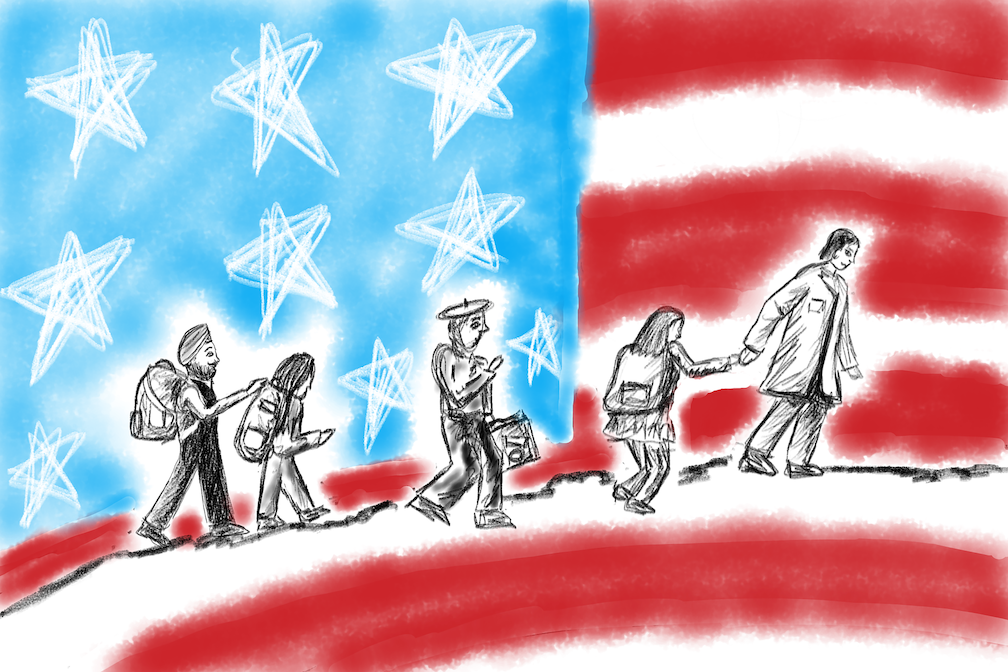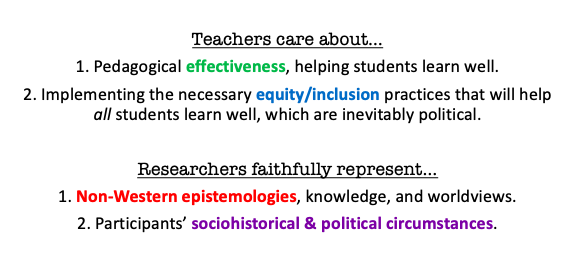In this post, I summarize a long book chapter by Wiley (2022), on a 60-year-long political campaign against bi/multilingual education in the U.S. that has a lot of money behind it. Prof. Wiley was President of the Center for Applied Linguistics from 2010-2017. He traces the anti-immigration sentiment from the immigration policy of the 1960sContinue reading “Well-funded lobbyists in the U.S. take resources away from bi/multilingual education”
Category Archives: Literature summaries
Dual Language Bilingual Education: What do teachers need to know?
What book about dual language bilingual education (DLBE) is so astute that you want to recommend it to every DLBE teacher, regardless of grade or languages taught? Renée DePalma‘s (2012) book about an English-Spanish kindergarten is the perfect primer on teaching in this type of program. Prof. DePalma shows how implementing the “target language only”Continue reading “Dual Language Bilingual Education: What do teachers need to know?”
Canadian French Immersion: What did it actually achieve, and to what extent can those findings be generalized?
From December 2022 to December 2023, I will attempt to summarize and comment on the practical implications of 13 classic books about bi/multilingual education that continue to be relevant in the field. The first is Merrill Swain and Sharon Lapkin’s book about Canadian French immersion, Evaluating Bilingual Education: A Canadian Case Study (1981). This bookContinue reading “Canadian French Immersion: What did it actually achieve, and to what extent can those findings be generalized?”
How to convince people to get rid of the “English only” classroom language policy at your school
In this week’s post, I summarize an audio-podcast from Harvard Business Review about how to ask for policy changes at your institution. The speakers were talking about policy changes in companies that give more rights to women, but actually, the strategies they talk about can be applied to making ANY policy change at ANY institution.Continue reading “How to convince people to get rid of the “English only” classroom language policy at your school”
When is it fair and valid to compare bi/multilinguals with monolinguals?
This is the question investigated by a team of 19 researchers in Norway, Spain, Germany, the U.K., the Netherlands, and the U.S. (Rothman et al., 2022), who wrote the commentary that I summarize in this post. A commentary is an essay with examples from empirical studies (“empirical studies” being articles with an Introduction, research Methods,Continue reading “When is it fair and valid to compare bi/multilinguals with monolinguals?”
What is translanguaging as “critical pedagogy” or “decolonizing research”?
In this week’s post, I aim to answer the question, “What does it mean when translanguaging is said to be a ‘critical pedagogy’ or ‘decolonizing research approach’?” This question is answered in recent commentaries by Pramod K. Sah (in collaboration with critical English language teaching scholar Ryuko Kubota) and Prem Phyak. According to Sah, toContinue reading “What is translanguaging as “critical pedagogy” or “decolonizing research”?”
“Is bilingualism a superpower?” (Why this question makes me rant)
This spontaneous essay (hence, not posted on a Wednesday) was prompted by an annoying Youtube video that came up on my feed titled “Is bilingualism a superpower?” I don’t provide the link because there are a gazillion other posts/videos online (usually American) suggesting the same idea. Such a question can only be taken seriously inContinue reading ““Is bilingualism a superpower?” (Why this question makes me rant)”
Code-switching researchers comment on how translanguaging achieves its social aims
In this research-oriented post, I summarize a new book chapter (Bhatt & Bolonyai, 2022) in which code-switching researchers argue that bi/multilingual people accomplish things in the social world by recognizing codes, not rejecting them. In the authors’ view, code-switching is still a preferable term to translanguaging because the social affordances of translanguaging (such as creativeContinue reading “Code-switching researchers comment on how translanguaging achieves its social aims”
What’s it like to grow up bilingual from birth?
In this week’s post, I summarize a book chapter by Fred Genesee, a leader in the field of “simultaneous bilingualism,” or bilingualism of kids who are raised bilingual from birth (compared to “sequential bilingualism,” or kids who only start to become bilingual when they start school). Genesee shares some generally known knowledge about simultaneous bilingualism,Continue reading “What’s it like to grow up bilingual from birth?”
Researching translanguaging QUALITATIVELY… with GENERALIZABLE findings?
In this week’s post, I summarize a paper that I co-authored with my doctoral student, Jiaen (Cheryl) Ou, in the journal System. We demonstrate that it is possible to research translanguaging qualitatively, with generalizable findings, and a positivist epistemology, while adhering to the principles of critical pedagogy. First, we developed a COMPREHENSIVE “assessment-as-learning” instrument forContinue reading “Researching translanguaging QUALITATIVELY… with GENERALIZABLE findings?”









